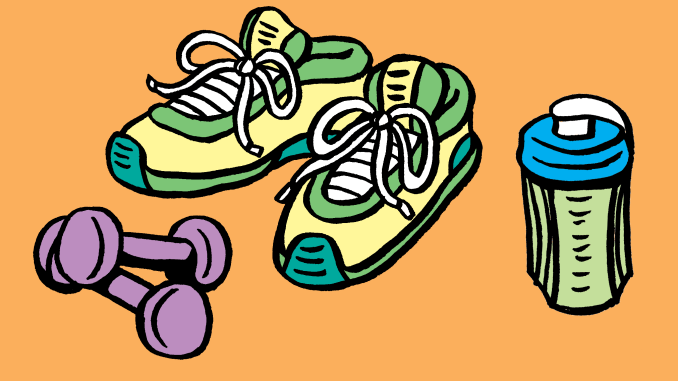
How it began
I was eight years old when I learned about New Year’s resolutions during a class project where we listed our resolutions for the year. For my first resolution, I decided to cut foods high in sugar out of my diet because I was already so concerned with how I looked, despite only being in second grade.
While other kids in my class wrote resolutions about doing chores or reading more books, I learned from watching my mom create her own resolutions, that they had one purpose, to try and get fit as quickly as possible.
It wasn’t just my mom who taught me that. Almost every magazine I read while growing up glamorized resolutions relating to body image. They all revolved around getting healthy and becoming the “best” version of yourself, which I now know creates unreasonable expectations like developing abs in only a week or having flawless skin forever.
The magazines my mom read, which I also read secretly, promoted resolutions about losing weight and committing to certain diets. They taught me that New Year’s resolutions were intended to focus on fitness and these were the only types of goals girls and women could set.
After reading those magazines, I attempted to fit into a certain mold of what I thought was perfect. I wanted to be taller with long legs, have pin-straight hair and clear skin with absolutely no acne. Nothing could stop me.
Each year, my need to be “healthy” only worsened.
Throughout my childhood I explored many different health fads, like week-long juice cleanses or attempting to transition completely to a gluten-free diet. While these changes didn’t seem inherently bad, my obsession with being fit made them dangerous.
2020, cut calories
In my senior year of high school, I decided I wanted to limit my calorie intake.
I began to track my calories on different apps, like MyPlate and MyBites, which was another habit I picked up from my mom, who always counted calories and watched what she ate.
While I initially used these apps to ensure I ate balanced meals, my resolution became unhealthy as the year progressed.
As I got more involved with fitness, I learned I needed to start burning more calories than I was taking in, to achieve my weight loss goals.
My desire to see balanced proportions quickly turned into an obsession solely focused on numbers.
While the average 20-year-old woman intakes about 2,000 to 2,400 calories per day, I averaged 900 calories most days. I carried this with me throughout my freshman year of college, and it’s something I still struggle with. Occasionally, I find myself falling into old habits like when I re-downloaded calorie-tracking apps only a few weeks ago.
Nothing made me happy anymore because I was constantly fixated on the numbers in front of me.
At the end of the year, I was exhausted from my unattainable goals. I knew in 2021, I needed to find a goal that would take my mind off of diet restrictions completely and decided to turn toward academics.
2021, be the best in my academics
In 2021, my freshman year of college, my New Year’s resolution was to raise my grade point average. After acknowledging my issues with my previous resolutions, I decided it was best to focus purely on academics and ignore practically all things relating to calories because I’ve always been an active learner and completing class assignments is something that’s made me happy.
I drowned myself in my school work for an online semester and set no boundaries between my academic life and social life. I constantly ignored invitations to meet up with friends and focused solely on my work.
At the end of 2021, I thought I would be more proud of myself as I managed to bring all of my grades up to A’s. Although I was satisfied, my improved grades weren’t enough for me to feel proud of myself because I knew I was missing out on the other half of the college experience.
Because I chose to stay in on weekends and often kept to myself, I was completely isolated. I felt alone almost every single day, but I still refused to let myself take a break from work due to my fear of letting my grades slip.
2022, be kinder to myself
My views on resolutions have drastically changed since 2008. I don’t look at magazines for guidance, and I continue to avoid health fads.
I’ve learned that resolutions do not mean I have to completely change who I am or what I look like in a year. Instead, I can use them as an opportunity to try new things or see new places. After failed attempts of losing weight through rigorous and unhealthy diets, I’ve realized that failed resolutions, like not being able to meet a calorie limit, do not define me because I have other attributes like my perseverance or generosity.
This year, I’m determined to make positive changes in my life relating to New Year’s resolutions. Instead of obsessively focusing on a certain goal, my resolution is to focus on being less harsh on myself, especially regarding things out of my control, and take the time to really learn who I am.
In 2021, I unknowingly started this journey by going to therapy. I’ve learned that when things become unhealthy for me, it’s essential I talk to someone about it, whether it be my therapist or people who are close to me.
With 2022 approaching, I want to take this year to amend the ways I’ve harmed myself through prior resolutions. I want to know my limits, whether it’s in trying to be more nutritious or trying to get better grades.



Be the first to comment